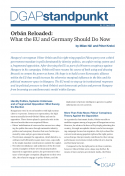Identity Politics, Systemic Unfairness and a Divided Opposition: What Swung the Election
Hungarians voted in record numbers with high turnout close to 70 percent. Contrary to expectations, the high turnout actually favored Orbán’s Fidesz and not the opposition. Three factors played a particular role in the electoral results that even surprised Fidesz:
- Fidesz’ mobilization of voters and its success in re-shaping the public discourse through nationalist identity politics and conspiracy theories that were further promoted by state and pro-government media;
- The division amongst the opposition, which failed to coordinate itself efficiently to gain more votes, especially in the single-mandate constituencies outside the capital.
- The inherent imbalance and unfairness of the electoral system. Examples of these were financial penalties imposed on opposition parties, the government’s reluctance of investigate corruption allegations on their own side, the refusal to engage in policy debates, and the deployment of private intelligence agencies to gather information on civic activists.
More Than Fake News: Fidesz’ Conspiracy Theory Against the Opposition
As a genuinely charismatic leader, Orbán was able to mobilize support among a large part of Hungarian society. However, he achieved it above all by deeply polarizing the country, through xenophobic rhetoric and a fear-mongering campaign focused on migration. His style echoed the current trend among populist right and far-right parties across Europe that previously contributed to their strong performance in elections in Italy in March or in Austria and Germany last year.
Compared to the far-right parties in these countries, however, Viktor Orbán went a large step further. By means of state and pro-government media, the Fidesz campaign promoted a conspiracy theory: The Hungarian opposition and civil society, it kept suggesting, were in league with the United Nations (UN), the European Union (EU), and the American-Hungarian philanthropist George Soros, and together, these were plotting to turn Hungary into an “immigrant country”, threatening the country’s security and national identity.
Government-organized media pushed this message via a massive fake-news industry. Although on a much smaller scale, a similar type of monothematic campaign and fake news had previously helped Miloš Zeman, once leader of the Social Democrats in the Czech Republic, to be re-elected as Czech President in January. Both campaigns further legitimized anti-EU and anti-immigrant discourses in Visegrád countries and elsewhere in Europe – undoubtedly they will find further imitators in the future.
The Opposition: Failures and Systemic Disadvantages
The leaders of Jobbik, the Socialists and several smaller liberal parties went on to resign after their defeat. Although it established itself as second-strongest party, Jobbik especially fell below its expectations: The party managed to win only one mandate (Dunaújváros) in the single constituencies, whereas Fidesz won virtually all the remaining individual seats.
The fragmentation of the opposition is certainly also a legacy of the historical failure of Socialists and liberals when they held government responsibility before 2010. However, acknowledging the opposition parties’ failure to unite against Fidesz, however, only partly explains their role in Orbán’s victory.
As the OSCE election observation monitoring detailed in its preliminary report, Hungary’s elections were characterized by “a pervasive overlap between state and ruling party resources, undermining contestants’ ability to compete on an equal basis”.
The opposition also largely failed to facilitate tactical voting: By withdrawing individual candidates it could have combined the opposition votes against the ruling Fidesz candidate much more effectively – a lesson possibly to be learnt for Hungary’s local elections scheduled in 2019.
Orbán’s Outlook: Selective EU Engagement While Dismantling Democracy at Home
Strengthened by the high turnout and Fidesz’ results in the polls, Viktor Orbán is likely to cement his power even further in his new term. During the campaign, he already promised a “settling of accounts – moral, politically, and legally” with his opponents. Among them are especially civil society groups and critical media that uncovered a range of corruption scandals, involving EU funds, at the top ranks of his regime and even within his family.
A legislation package targeting NGOs working in the field of migration would be among the first bills to be submitted to the new parliament in May, the government’s spokesman Zoltán Kovacs announced. Echoing Fidesz’ conspiracy campaign, he referred to it as the “Stop Soros Package”.
Further clampdowns on the civil society and the reaming independent media are expected to go along with a curtailing of the remaining semi-independent branches of the state such as the judiciary and the local municipalities. Together, these steps will not only strengthen the autocratic features of the Orbán’s government, they will also lead to a de facto abandonment of EU democratic norms in Hungary.
Safeguarding the Rule of Law: The Options for EU Institutions
Viktor Orbán’s strengthened position at home also leaves him with more bargaining power in Brussels. Some of the important decisions the EU is facing in coming months – among them the reform of the EU’s rules on political asylum – require unanimity among the member states, and Hungary is seen as the main obstructionist player. The pending asylum law reform, to be wrapped up by June, is likely to embolden Orbán to strike a deal on a key issue for Germany. In fact, the EPP leader of the European People’s Party (EPP), Manfred Weber – deputy party leader of Germany’s conservative CSU in Bavaria – is already courting the Hungarian Prime Minister for a compromise.
Orbán’s influence as a ‘successful leader’ of Central Europe is therefore likely to increase at least temporarily, and Hungary’s partners in the EU will have to find ways to accommodate Hungarian interests further. Nevertheless, it would be huge mistake to lose sight of Orbán’s domestic drive to distort Hungary’s democratic foundations to facilitate his power grab.
The first line of defense should be with the EU institutions even if they work in a slow motion. The European Parliament could initiate the so-called ‘nuclear’ option of Article 7 of the Treaty of the European Union which would allow to suspend rights from and impose possible sanctions against Hungary. This would require a complex procedure based on the report on the state of the rule of law in Hungary currently drawn up by the European Parliament’s Committee on Civil Liberties and Home Affairs (LIBE). LIBE is due to discuss its report in an upcoming meeting on April 12, and the report is expected to be put to a vote in a plenary session of the European Parliament in September 2018. It would require a two-thirds majority to pass through.
On the EU budget, the Commission is going to propose a mechanism of tying the EU cohesion funds to compliance with the rule of law. But in the end, it requires unanimity vote from member states.
Bargaining and Coalition-Building: Orbán vis-à-vis V4, EU, and Germany
Orbán’s past course of action has shown that he approaches the European Union selectively: In his new term, he will likely extend his two-pronged approach of both “less” and “more Europe”. He will seek to weaken the EU to prevent it from interfering with national policies on justice and home affairs that are regarded as controversial in Brussels. At the same time, he will support and pursue engagement with the EU in areas such as the single market, external border patrols and deportations, as well as European defence and EU enlargement.
At the end of the day, Prime Minister Orbán approaches politics as a transactionist looking for grand bargain. He tends to step back from controversial steps at home when he reckons that he will face serious consequences. Unlike Poland’s illiberal leader Jarosław Kaczynski, however, he is also very careful not to risk too much isolation within the EU. Orbán is aware that Hungary is a comparatively small country and that he needs to cultivate relationships to improve his country’s and his personal international position.
Apart from the issue of migration, Hungary’s influence at the European Council is comparatively marginal: It has not succeeded in leading constructive policy proposals that would have aimed for a different vision of Europe. Although not without effect, Orbán’s actions have so far been ‘obstructionist’ rather than constructive. His approach often provides fresh impulses to EU debates, but Orbán is, indeed, rather discreet about his true plans for the future EU. Government sources indicate that he wants to construct a broader Eurosceptic block around Hungary and Poland: As a new sceptical alliance within the EU, they would then take on the role previously played by the UK. In this way, they would counterbalance to the more integrationist visions for Europe held by Germany and France.
However, while the Visegrád Four (V4) group is giving Orbán a regional platform, it has been increasingly unable to agree on any proactive proposals on Europe. The group also keeps losing key votes in Brussels, such as the new Directive on Posted Workers of October 2017, in which the Czechs and Slovaks opted for a favorable compromise with France. In July 2018, Slovakia is set to assume the presidency of the V4 group – to be followed in 2019 by the Czech Republic – and it is expected to set a more pragmatic EU agenda. It is likely, therefore, that Viktor Orbán will be looking for allies beyond the Visegrád Group in his new term in office in order to accelerate his anti-Brussels coalition building. Italy, Romania and Austria could be possible partners of interest for him in this regard.
Meanwhile, Germany and France are seeking a compromise on euro area reform, which can lead to deeper integration among its members. Also, in other policy areas, cooperation in smaller groups than the EU-27 is likely to spread. Given this prospect, Germany’s insistence that the EU will embrace all of its members and safeguard its cohesion is crucial also for Hungary, as it does not want to be pushed aside.
Budapest, Berlin and Brussels: What Needs to Happen Now
Several high-ranking sources in Budapest have signalled that Prime Minister Orbán is likely to seek a relaxation in bilateral relations with Germany following the elections. This might present a diplomatic opening, which Germany could pursue – not only toward Hungary’s increasingly autocratic government but also toward Hungarian society.
Four sets of actions and considerations are advisable:
- Germany should pursue opportunities for pragmatic engagement and dialogue to discuss Hungary’s expected new anti-NGO law before it is implemented, and Berlin should also involve other EU members in doing so. Equally, it should not only be diplomats talking to their Hungarian counterparts. Members of national parliaments serving in EU committees could consult with Hungarian lawmakers and NGO representatives. This would bring Hungary’s anti-democratic moves into the spotlight and also involve Hungary’s civil society in the effort to safeguard the rule of law. Not much time remains for Germany and the EU to engage with Hungary on this issue: Once the new law is passed, it will be too late.
- Certainly, Hungarian civil society, NGOs and the remaining independent media in the country also face a responsibility of campaigning more visibly against the upcoming anti-NGO law. While they advocated very strongly against the closure of the Central European University in 2017, public protests and international advocacy campaigns against the anti-NGO law has been comparatively muted so far. Civil society and other European and international stakeholders need to step up their efforts in this regard urgently.
- It will be crucial for the centre-right European People’s party (EPP) – in which Fidesz is a member – to exert political pressure on Orbán during his next term. Orbán is one of the Europe’s longest-serving leaders and has important allies. He is also an attractive partner for leaders of the German CSU in Bavaria and Austria’s ÖVP, as he reinforces their claims of being ‘tough on migration’ among their own voters.
- While Orbán cultivates these conservative alliances, his political style and rhetoric at the same time gravitates closer to their far-right rivals, the German Alternative für Deutschland (AfD) and Austria’s Freiheitliche Partei Österreich (FPÖ). This begs the question which direction he will choose – towards more extremism or rather a stay within the centre-right camp. Most likely, he will try to have it both ways: He will continue to develop relations and sympathies with the far-right parties and, at the same time, cultivate his position and his ties within the EPP. Similar to his simultaneously pro- and anti-Europe stance, he knows he can risk alienating the EPP only so far without losing it as a protective umbrella.
Ultimately, however, both Germany and Brussels should also keep Orbán’s proclamations in perspective: While his moves to dismantle democratic standards in Hungary are alarming, his diplomatic reach outside Hungary is also limited. Orbán’s allies among Western European governments – such as Bavaria’s CSU which last fêted him at their annual party conference – at times underestimate that Orbán is loud rather than effective on the European stage.
In the summer of 2019, the balance of power in the European Union and its political agenda will be redefined by the next elections for the European Parliament. Afterwards, the EPP will have to re-think its approach: Expelling Fidesz – and thereby a strong member state government – from its ranks is unlikely. Nonetheless, the EPP will have to figure out how to keep Orbán’s government within some red lines. It will also have to consider how to enforce these lines if necessary to avoid a repeat of 2017 when Hungary’s initial measures against NGOs with foreign funding were passed into law in despite previous warnings from the EPP.
The European Union and its member states will also have to develop efficient responses to the Eurosceptic and anti-Western rhetoric of Orbán’s government. It already has an impact on the society. So do new laws and executive measures that erode Hungarian democracy and legitimize illiberal practices and far-right rhetoric for current and future governments across the EU.


